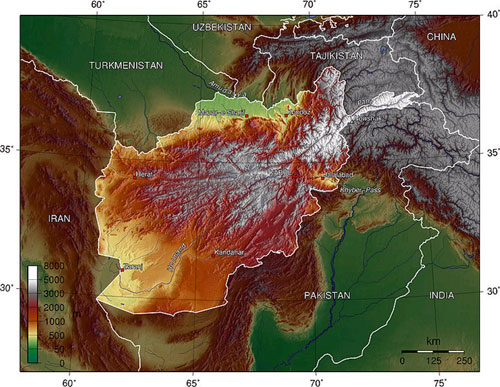NYT’s trillion dollar Afghan story runs into trouble
18 Jun 2010
A New York Times story on Afghanistan's apparently vast mineral resources has come under fire for regurgitating old material and passing it off as new. On its appearance the story immediately grabbed eyeballs as it had all the necessary ingredients –a war-torn nation, a virulent insurgency, rising deaths amongst the foreign expeditionary forces, the Taliban, a corrupt government at Kabul and, of course, the magical words – a trillion dollars.
It also had the name of a celebrated journalist adorning the byline.
The author of the story, which claims that Afghanistan's vast mineral resources are worth at least a trillion dollars and include vast reserves of rare metals such as lithium, is a Pulitzer Prize-winning American journalist, James Risen. He has written or co-written many articles concerning US government activities and is also the author or co-author of two books about the Central Intelligence Agency (CIA).
The story's startling content made it appear that a new chapter in that country's sorry history was about to unfold, allowing readers to imagine that foreign nations in Afghanistan would steel their resolve to fight the evil Taliban and tap vast natural resources for the benefit of their respective countries - and also, incidentally, for the poor Afghans.
Eyeballs popped when reference was made to lithium, a critical component of electronics. One official tells Risen that Afghanistan could become the ''Saudi Arabia of lithium''
Almost immediately the story came under fire as observers felt that far from presenting some startling new facts about that war-torn nation Risen was actually regurgitating, and overstating, known facts - a celebrated resume notwithstanding.

Suspicions were also stoked as people found the timing of the story too suspect.
The US military mission in Afghanistan has come under increasing pressure with an alienated Hamid Karzai acting tough with Washington, with military operations - including a hugely hyped one at Marjah - floundering, with the Marines and international forces taking higher casualties than ever before and the US Congress beginning to ask uncomfortable questions.
The news is bad as far as the allies are concerned as well, with the British hunkering down to reviewing their entire involvement in this country. Though their commitment to the war in Afghanistan is not suspect the fact is that the British military and bureaucratic heads have received the sack. The new coalition government has asked the British chief of defence staff, Sir Jock Stirrup to leave before his time is up and, similarly, marching orders have been served on the defence secretary as well - who is the civilian head of the military bureaucracy.
Observers also got suspicious with the story when they found General David Petraeus, the American CENTCOM chief quoted as saying Afghanistan has enormous strategic importance , or words to that effect, because of the mineral resources – the military are normally not known to be so liberal with their quotes and that too headline grabbing ones.
There were other small giveaways with a lowly deputy assistant secretary of defence being promoted by the author of the story to undersecretary of defence to lend weight to the story.
When the blogosphere immediately attacked the story pointing out how these so-called 'facts' have actually been in circulation for quite some time, Risen tried to bluster his way out of trouble by flaunting his resume and telling bloggers to shoo off in the most intemperate language.
When that failed to impress, his editors at the NYT bailed him out by suggesting that the Pentagon actually had nothing to do with the story which, indeed, was an old one that Risen had forgotten about and was recently reminded about by his editors.
This is what NYT bureau chief Dean Baquet told Lloyd Grove of the Daily Beast once Risen and the blogosphere had locked horns: ''Jim had been working on a bunch of stuff, but some of it had been put in a little bit of limbo. Months ago, he told me he had gotten this tip about the extensive survey work in Afghanistan that had never been done before. So two weeks ago, I told him, why don't you go back to the Afghanistan mining story and do that one? And that's it. There was literally no leak.''
For the record this is an extract from an old report dated 8 March 2009, reported by Jonathan S. Landay for the McClatchy Newspapers (China's thirst for copper could hold key to Afghanistan's future). This is to provide a sense as to how existing material has been regurgitated into headline grabbing stuff.
''China may hope that the Aynak deal will help it position it to compete for more projects in Afghanistan, where three tectonic plates converge. The region is thought to hold some of the world's last major untapped deposits of iron, copper, gold, uranium, precious gems and other raw materials.
"It's the last frontier," said the second Western official.
The U.S. Geological Survey estimates that Afghanistan also has more than 1.5 billion barrels of oil - almost untapped since soldiers of Alexander the Great discovered pools of oil in the north more than 2,000 years ago - and 15 trillion cubic feet of natural gas.
Two other major copper deposits are close to Aynak, and the government is preparing to solicit bids for a lease to develop the Hajigak iron mine, which Minister of Mines Ibrahim Adil last year said contains an estimated 60 billion tons of ore.
Ashraf said that China and India have shown an interest in Hajigak.
"When we have a little security here, this will be a paradise to come and mine," he said. "We are near the markets. Those markets are China and India. The transportation is not difficult. The difficulty is that everyone says, 'We must have security and then we will invest."



















